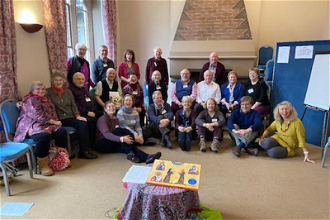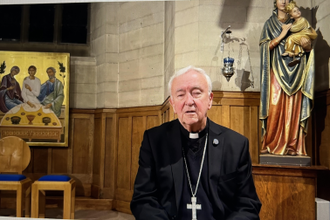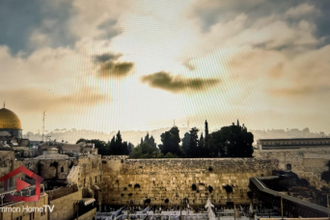Text: David McLoughlin on 'Jesus, Work, & the Kingdom of God'

David McLoughlin
Jesus, Work, and the Kingdom of God - a challenge to Church and State
The following talk was given by David McLoughlin at the Annual Conference of the National Justice and Peace Network 15-17 July 2011. The theme of the conference was ‘Justice at Work: A place of safety, fulfilment and growth?’
The Galilee of Jesus was divided by tensions of a structural nature - social, political and economic - Jews/Gentiles, rulers/ruled, rich/poor. This was the result of two imposed rules - the Kingdom of Herod and the Reign of Rome. When Jesus preached a different Kingdom he found eager ears among the mass of the people. But he also inevitably provoked serious concern in those who had vested interests in maintaining the other two ‘Kingdoms’.
As a tekton, a craftsman, Jesus and Josef may have taken part in the construction of Sepphoris, situated six km from Nazareth. Destroyed in 4 BC by Quintilius Varus it was reconstructed by Herod Antipas as a capital during Jesus lifetime, until he founded Tiberius in 19 AD as Galilee’s new capital, on the shore of the Sea of Galilee. It had a theatre that could seat 5000 and a Basilica that bears a remarkable likeness to some of the larger Tescos! Although its site bears witness to traditional Jewish ritual practices (eg Miqweh/ritual baths) it bore all the hallmarks of sophisticated Hellenistic culture. His teaching certainly shows awareness of "playacting/hypocrisis" (Math 6:2, 5, 16; Mark 7:6, Lk 13:15) of serious banking = the parable of the talents (Lk 19:11ff), and of courts for debtors which Josephus mentions as being based in Sepphoris. These are all specific to Hellenistic culture rather than Jewish. The silence of Jesus and the Gospels on Sepphoris as such remains fascinating.
The Land, the Rich and the Poor
The greater part of traditional Galilean economics depended on agriculture and fishing. Ownership of the land was a key element, as indeed it remains in any peasant society, except in Palestine there is the added religious significance that the Land is primordially God's gift to Israel and so belongs ultimately to God alone and to the Jewish people as God's chosen tenants. The archaeological findings in Galilee show a gradual shift from smallholdings to the emergence of vast centralised estates. Josephus speaks of these in his Vita,71. There were great estates just north of Sepphoris, so in walking distance of Nazareth, and Josephus tells how the village around Gischala has to pay part of its harvest in Imperial taxes.
We know that members of Jesus extended family were smallholders as Eusebius in his Ecclesiastical History (3, 20,1-6) tells of how the emperor Domitian had the Grandsons of Jude one of Joseph's sons, so Jesus nephews, brought before him to question whether they were truly of Davidic descent, and to ask about the possible coming of Christ. They acknowledge their Davidic ancestry and give an account of themselves but the Emperor decides they are of no significance and lets them go. The reason? They had such little land and their hands and bodies were those of manual workers. So Jesus extended family included agricultural workers like most people. We hear so much in the Gospel of craftsman and fisherman because they were the only other significant types of workers. Jesus is a tektõn, Justin Martyr (Dial 88) says such people made ploughs and yokes. They were craftsmen who could work either stone or wood, although there was little wood in Palestine.
The collusion of the Temple and the Priesthood
Its worth noting that although the people of Galilee had tax to pay to Herod and various duties on produce to Rome they were still required by the Priestly aristocracy in Jerusalem to pay tithes and offerings to the Temple and the priesthood. The Gospels start with a picture of Jesus as the devout son of devout observant parents who make the pilgrimage to Jerusalem and that it is the most natural thing in the world for him to consult the priests and elders when he is 12 years of age, but as his public ministry develops his critique of the temple and its manipulation becomes ever more severe. In this he is ahead of his time. The Talmud the later collection of post Temple Jewish wisdom has a famous lament:
"Woe is me because of the house of Boethus
Woe is me because of the staves.
Woe is me because of the house of Annas
Woe is me because of their whisperings.
Woe is me because of the house of Kathros
Woe is me because of their pens.
Woe is me because of the house of Ishmael ben Piabi
Woe is me because of their fists.
For they are High Priests, and their sons are treasurers, and their sons-in-law are temple overseers, and their servants beat the people with clubs."
(b. Pesahim57a; t. Menahot 13:21)
The Great Tradition Deconstructed
Jesus’ analysis was merely ahead of the game. What the quote points to is the use of violence, the keeping of records of debt, manipulation of Temple positions, the use of rumour to control. It is in his parables that Jesus begins to open this up. In doing so he challenges the ‘Great Tradition’ that among the leaders of his people is the accepted account of how things are, history as it were from above, an imposed ideology that legitimises the domination of the masses by a wealthy and powerful elite. ‘Great Traditions’ are nearly always urban based and written since the written text is always seen as more powerful and of course needs its interpreters, scribes. At the heart of the Great Tradition in Jesus’ time is the emphasis on ritual purity and the following of all the Sabbath laws; this is the sign of a true paid up child of Abraham. John the Baptist had already railed against this legitimised corruption of the national myth cf Luke 3:7:
"Brood of vipers! Who warned you to flee from the coming retribution. "Produce fruit in keeping with repentance, and do not start telling youselves "We have Abraham as our Father”, because, I tell you, God can raise children for Abraham from these stones. Yes even now the axe is being laid to the root of the trees, so that any tree failing to produce good fruit will be cut down and thrown on the fire."
Jesus will confront this elitist use of Abraham in the Great Tradition and subvert it in the Parable of Dives and Lazarus which we will look at in a moment. What Jesus is doing is picking up on what some scholars call the ‘little tradition’ the oral tradition of the illiterate peasants which in however inchoate way they identify with, the tradition of the protesting prophets, and of the Creator God and his covenant with Creation. Always he seeks to sharpen and deepen what they already know. In doing so he is awakening them to areas of their faith that have been underplayed or forgotten; he is giving them back their own history, a sense of themselves under God, but not the God they have access to via the manipulation of Jerusalem’s Temple authorities but rather the creator who is as close to them as a beloved Abba and who establishes them as wanted children. He is trying to break the negative picture they have had imposed upon them by those who control them and which they have partly internalised eg the rich are blessed by God and the poor are poor by the will of God.
The Parables of the Alternative Kingdom
Let’s take a few of Jesus parables and read them against this backcloth. Its worth remembering he taught these parables to groups, crowds, communities. They were intended to provoke discussion, conversation, raise awareness. They were the starting point of a process not the end. They got people to a possible shared ‘light-on’ moment which could then have further consequences. If a group saw the implication of a parable then they saw their world differently and had a choice to make - whether to stay with the way things were or to step out into this new “kingdom” way of looking at things.
Dives and Lazarus: the filthy Rich and the dirt Poor Lk 16:19-13
Here we have a representative of the powerful in the land in purple clothes, which cost a fortune and imply a royal or imperial official, whose fine cotton is imported, then as now, at great cost from Egypt. Lazarus meanwhile is described as ptokõs - destitute, corpselike, almost carrion for the wild dogs. Although in fact they alone are kind to him, licking his sores which are the result of malnutrition. The difference between the two protagonists could not be greater and to underline this Jesus emphasises the great gate that keeps Lazarus (whose name ironically means "God helps") excluded. If only the gate had been open everything would have been different. The rich man dies and is buried with honour.
Up to now we have the Great Tradition’s view of the order of things, but Jesus continues the story and the order unravels. Now in paradise, like a privileged dinner guest, Lazarus reclines on the breast of Father Abraham and Dives is in torment in Hades; not Hell but the place where you await the resurrection and learn the lessons you should have done in life. But what has Dives learnt? He asks Abraham to command Lazarus to bring him water but Abraham reminds him of his life and that this is the consequence. There is a play here between the gate Dives could have opened at anytime to have comforted Lazarus and the great gulf which now separates them. Next Dives asks Abraham to send Lazarus to his brothers so they can avoid his fate. Abraham points out they already have all they need - the teaching of Moses. Again notice how Dives speaks of Lazarus - as an insignificant slave. He has learnt nothing. And then that extraordinary ironic sentence "If someone goes to them from the dead they will repent.” Then Abraham's retort that if they have ignored Moses and the prophets, who spoke God's word, why would they listen to one resurrected.
Throughout, Abraham seeks Dives’ recognition of Lazarus as equally a child of God. The language he uses of Dives is teknon/child and Dives indeed calls Abraham pater/father but he remains within his own class and family consciousness; he only cares about his brothers. He cannot see Lazarus as a child of Abraham and therefore as his brother. This is the teaching of the Torah in which the land is for all - its produce must not be hoarded but shared, so that even the widow, the stranger and the orphan have enough (Lev. 25; Deut. 15:1-18). In telling this story Jesus places himself squarely in the prophetic tradition of Isaiah 1:16-17,5:7; Jeremiah 5:23-29; 21:11-14; Amos 2:6-11; 5:10-24 and Micah 3:1-3, 9-12 - condemning the exploitation of earlier generations of Kings and oppressive royal officials. It also reveals how class and family interests within the new economy have undermined the sense of solidarity of the people.
The parable gives the people a way of interpreting the two tiered society of the time with Herod and the elite landowners in Galilee and the aristocratic Priesthood in Jerusalem and Judaea. That such a great divide could have opened up between the rich and the poor is the direct result of serious interest on loans, of high taxation and their consequences. The parables open up the reality but they also provoke thought - what could make a difference? In the parable of Dives and Lazarus, Jesus allows Abraham to be the teacher. What is required is the re-establishment of a sense of mutuality, of fundamental relationship or kinship. Without this it is possible for the rich to continue to exploit the poor, seizing land and building great estates through the manipulation of debt (Roman imperial policy – Latifundia mapped out by Cato 2nd BCE, Varrin 1st BCE, Columella 1st CE). The shared space that they all once inhabited as Israel, the people of God, has been undermined. But not only undermined but re-interpreted. The poor are to believe this is God's will/blessing.
Jesus tells the story to unravel the situation - the destitute on the street becomes the honoured guest at the heavenly banquet. How is this possible? Either something is wrong here or something is wrong in the afterlife. The story is strange since it includes the ordinary everyday world, a beggar at the door, with the world of the elite super-rich who are not part of the everyday - but in telling this story Jesus’ listeners begin to see the relationship between the stellar wealth of the minority super-rich and the growing poverty of the masses. And they have an insight into what might change things - a rediscovery and re-embracing of the vision of kinship and hospitality of Moses and the prophets. It is particularly fitting that Jesus should have used Abraham, who the elite had used as the symbol of their class and its ethnic purity and, who in a certain sense legitimated their rule (Lk 3:7-9). But in Jesus’ story Abraham is now the one who restores true kinship and hospitality to the destitute.(Lk13:28-29)
Let’s take another example:
Workers in the Vinyard : Solidarity Lost and Oppression revealed. Mt 20:1-16
Here we have day labourers, some of whom would have been smallholders trying to implement their subsistence living, some landless and destitute without the support of extended family or local community, some would be wandering and so strangers to the locals so here we have differing working groups vying with each other for limited work. Any sense of solidarity and identity has long gone. Normally it would be a steward hiring them, as the land-owners tended to live in the new cities and had little to do with the day to day running of the estate but Jesus deliberately includes the owner here, to again make the link between those at the top of society and those at the base. The normally invisible elite are here made present and, as such, accountable.
They are harvesting grapes and the harvest is a bumper one, the owner must harvest at the optimum moment for the fruit and so goes back again and again to the marketplace until he has enough labour to bring in the harvest. The owner offers the first group a denarius, a reasonable amount, but not generous, for a day’s work - enough to keep a small family fed and housed. When he comes back he just tells the next group to go to work and he'll give them what is right. There is no negotiation. The next are told to go without any reference to pay, similarly the last lot for an hour – throughout the landowner has total control.
The owner tells his steward to pay them in reverse but orders him to give them all a denarius rather than a proportion of the daily wage equivalent to their hours. The owner is playing with them, it is a gesture of contempt, an insult implying those who have worked all day are no more valuable than those who have worked for an hour. So shaming is the insult that the workers protest, if they don't then the value of their work in the marketplace is undermined and implicitly they are accepting his right to pay less the next time.
Note the owner does not address the group, he makes an example of one labourer, “I do you no wrong, did you not agree with me for a denarius?” As though there has been a mutually agreed contract. Then he expels the labourer “Take what is yours and go”. He is sacked he will not be hired again. The seemingly generous boss is revealed as something quite different, cynical and manipulative.
He turns to the group and gives his justification: “I choose to give to this last what I give to you first lot". The money is now his gift, no longer a wage earned. He says their complaint is evil in response to his goodness (literally "is your eye evil because I am good?"). He speaks as though the land is his and he controls its fruit and profit, but the Torah teaches the land is God’s and God alone distributes it to the people of the land. The Torah demands re-distribution in times of need and condemns hoarding for profit. Even the denarius he so generously gives is a subsistence wage. Jesus story takes his listeners into the heart of the covenant and its liberation. It heightens the perversion of the covenant by the powerful rich but it also shows up the lack of solidarity among the poor themselves - the rich man can isolate one worker and silence their initial protest. The debate after this parable must have gone on a long time!
Note again what Jesus is doing in these parables. He is drawing on the experience of the people, provoking them to see their world clearly but from a renewed perspective, “the kingdom of God”, and inviting them to become subjects of their own history. He empowers the exploited and oppressed to re-claim their history, to see it anew, and to participate in creating it. There is a danger when we read these texts in church that we spiritualise them and tend to take away a personal message – what do they mean for me? Then we miss their call to renew our collective vision of a creation under God where all are of equal worth and where the distribution of the goods of the earth, and the sharing of them, and solidarity in service, are at the centre of our collective concern rather than accumulation for profit and personal security. Above all these are texts to provoke collective reflection, discussion and debate, starting from the conflicted reality we find ourselves in.
It is always dangerous when such texts become the texts of an elite – the ordained, bishops, theologians, etc, because then they can too easily be co-opted into other Great Traditions which often have little to say to the reality in which the mass of the people find themselves. It is always a risk when the community of the kingdom of God finds common cause with a political great plan – as in the Big Society.
As the old saying goes: When you sup with the devil you need a long spoon.
David McLoughlin is Senior Lecturer in Theology at Newman University College and is honorary lecturer at the University of Birmingham. He is a founder member of the Movement of Christian Workers.
See also: ICN 18 July 2011 Cardinal Turkson praises J&P conference www.indcatholicnews.com/news.php?viewStory=18624


















